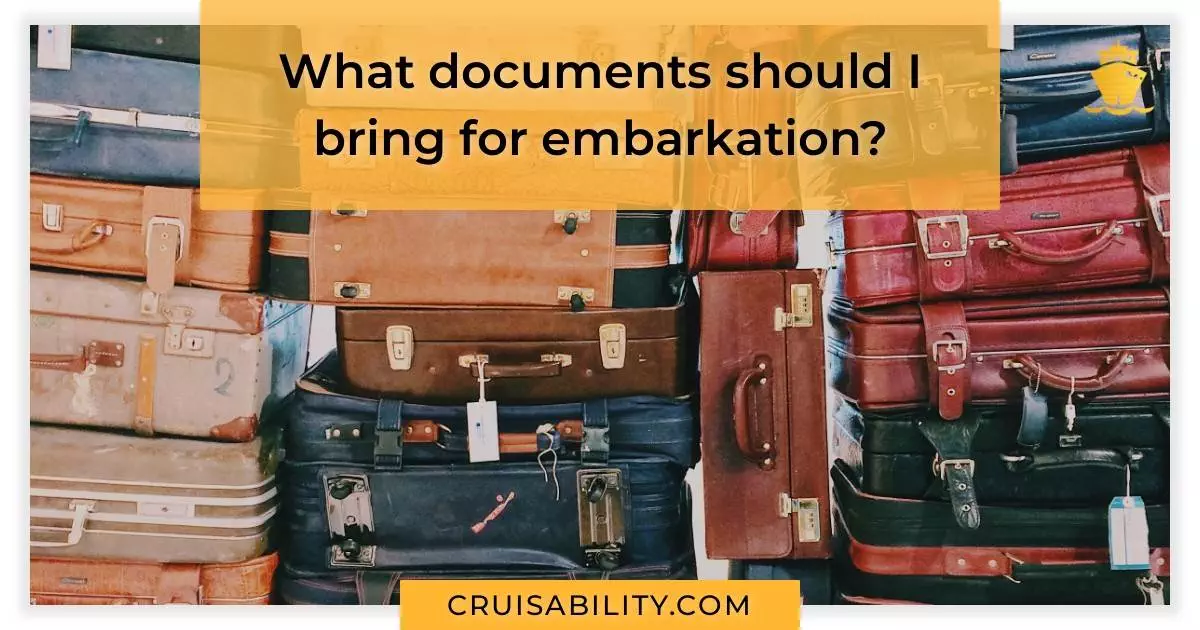When preparing for a cruise, it’s essential to have all the required documents to board the ship. Embarkation documents are cruise travel essentials that should be on every packing checklist. The required travel documents for boarding a cruise ship depend on multiple factors, but the most crucial element is the itinerary and the countries visited during the trip. Here’s a comprehensive guide on the different types of required documents for your next cruise.
Types of Required Documents
Passport
A passport is the most commonly used travel document worldwide and is required when traveling to almost any international destination, including most cruise itineraries. A passport verifies your identity and citizenship. Most cruise lines require that your passport remains valid for at least six months beyond the end of your cruise.
Enhanced Driver’s License (EDL)
EDLs are state-issued driver’s licenses that are enhanced to serve as a proof of both identity and citizenship. They are acceptable travel documents for crossing land and sea borders between the United States and Canada, Mexico, Bermuda, and some Caribbean islands. Not all states issue EDLs, so check with your state department of motor vehicles to see if it is an option for you.
Trusted Traveler Program Card
The Trusted Traveler Program Card is an approved document for crossing land and sea borders between the United States and Canada, Mexico, Bermuda, and some Caribbean islands. The most common programs are Global Entry, NEXUS, SENTRI, and FAST. These programs require a background check and application process, which may take several months to complete.
Birth Certificate and Government-issued Photo ID
For closed-loop cruises, i.e., those that begin and end in the same U.S. port, travelers may use a government-issued photo ID, such as a driver’s license, and a birth certificate as an alternative to a passport.
Visa and Other Entry Requirements
Each country has its entry requirements, and it is the traveler’s responsibility to obtain the necessary visas and other documentation before the cruise. The cruise line will provide the necessary information, but it is ultimately the traveler’s responsibility to ensure that they have all the required documents before embarking on the voyage.
Medical Documents
If you have a medical condition that requires specific medications or treatments, it’s essential to carry all necessary medical documents, including prescriptions and medical history.
Cruise Line-Specific Documents
Cruise lines require specific documents, such as boarding passes, e-tickets, or luggage tags. These documents will be sent to you before the voyage or will be available on the cruise line’s website. Make sure you have printed copies of all the documents and have them ready when you arrive at the port.
Important Information to Remember
Check with the Cruise Line
Before your cruise, check with the cruise line to see what documents are required and recommended for your specific itinerary. Different destinations have different entry requirements, and a failure to comply with these requirements may result in denied boarding or disembarkation at the next port.
Ensure Documents are Current and Valid
It’s essential to ensure that all documents are up-to-date and valid. Expired passports or other entry documents may result in denied boarding or disembarkation at the next port.
Plan for Unexpected Situations
Always be prepared for unexpected situations, such as flight cancellations, weather delays, or medical emergencies. Carry extra copies of all documents and keep them in a secure place.
ALSO READ
Are the Documents for Embarkation Included in the Must-Have Items for Cruise Packing?
Yes, the documents for embarkation are essential cruise packing must-have items. Each passenger must carry their passport, boarding pass, and any necessary visas or identification when boarding a cruise. It’s important to keep these documents safe and easily accessible throughout the embarkation process.
Conclusion
Having the required travel documents is crucial to embark on your cruise adventure. Make sure you have all the necessary documents and have them organized before your trip, so you can have a stress-free boarding experience. Remember to check with the cruise line and verify the entry requirements for your specific itinerary and plan for unexpected situations.
- Embarkation documents are cruise travel essentials that should be on every packing checklist.
- A passport is the most commonly used travel document worldwide, and most cruise lines require that your passport remains valid for at least six months beyond the end of your cruise.
- Enhanced Driver’s License (EDL) is a state-issued driver’s license that is enhanced to serve as proof of both identity and citizenship.
- The Trusted Traveler Program Card is an approved document for crossing land and sea borders between the United States and Canada, Mexico, Bermuda, and some Caribbean islands.
- For closed-loop cruises, travelers may use a government-issued photo ID, such as a driver’s license and a birth certificate, as an alternative to a passport.
- Cruise lines require specific documents, such as boarding passes, e-tickets, or luggage tags.
- Check with the cruise line to see what documents are required and recommended for your specific itinerary.
- It’s essential to ensure that all documents are up-to-date and valid.
- Always be prepared for unexpected situations, such as flight cancellations, weather delays, or medical emergencies.
RELATED ARTICLES:

